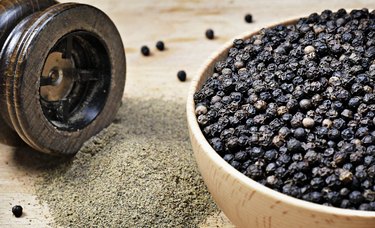
Second only to salt, black pepper is one of the most widely used seasonings. But it doesn't get nearly as much attention as salt, too much of which can increase your risk of heart disease. Aside from potential digestive distress if you eat too much, there aren't any black pepper side effects.
Tip
Black pepper side effects could include digestive distress if you eat too much. Otherwise, it's a healthy spice you can use liberally.
Video of the Day
Black Pepper Basics
The use of black pepper in Western cuisine is ubiquitous. "Season with salt and pepper to taste," reads just about every recipe, and it's a mainstay on restaurant tables around America. But its effects on health are rarely talked about.
Video of the Day
Any black pepper side effects or risks are most likely due to ingesting excessive amounts. As with any other spice, large amounts of black pepper could irritate the digestive tract and cause gastric distress. How much pepper you can eat without digestive upset is an individual matter.
Adding more pepper to your foods is far more likely to benefit your health, as long as it doesn't upset your stomach. Like most spices — and plant foods, in general — pepper contains substances called phytonutrients, which are naturally occurring bioactive chemical compounds. Phytonutrients aren't considered essential nutrients like carbohydrates, proteins, fats, vitamins and minerals, but they may still play a significant role in human health.
The active compound in black pepper is called piperine, and it comprises approximately 5 percent of the spice, according to the University of Massachusetts Medical School. Piperine is similar to the capsaicin in hot peppers and curcumin in turmeric — all three are responsible for the pungent, spicy flavors of the plants they come from, as well as for their potential health benefits.
Piperine's Potential Health Benefits
Piperine's interaction with curcumin in turmeric is one of its primary benefits. Curcumin is widely known for its anti-inflammatory and antioxidant effects, but according to a research review in Advances in Nutrition in January 2018, curcumin has poor bioavailability in the body. Whether consumed via food or supplement, more than 90 percent of curcumin is excreted in feces.
Piperine can inhibit the biotransformation of curcumin, or the process by which curcumin is metabolized by the liver for excretion from the body. The addition of piperine can increase curcumin bioavailability by 2000 percent, reports a research review in Foods in October 2017.
According to the University of Massachusetts Medical School, as little as one-twentieth of a teaspoon of black pepper can improve your body's ability to absorb curcumin. You can reap the benefits by combining turmeric and black pepper in recipes.
But perhaps you're more interested in whether black pepper benefits weight loss. Spices in general can increase thermogenesis — the production of heat in the body that uses energy, or calories. This does give your metabolism a slight boost, but according to the U.S. National Library of Medicine, it's not enough to have a significant effect on your weight. Controlling your calorie intake is still the most effective way to burn fat.
Researchers of a small study published in Food & Function in April 2018 propose that black pepper may be able to help with that by suppressing appetite. A group of 16 men and women were given either a black pepper drink or a control beverage not containing the spice before a white bread meal. The black pepper beverage lowered participants' subjective appetite ratings including hunger, desire to eat, satiety and fullness.
Does that mean you should chug a glass full of black pepper-laced liquid before each meal? Probably not. The mechanisms of its action are unclear, and the researchers acknowledged the limitations of their study. Other research on appetite has shown that simply drinking a glass of plain water before a meal can also reign in your appetite, so, at least for now, that's the better — and more palatable — option.
Black pepper's other potential benefits, including cancer prevention and treatment, and cognitive enhancement, aren't as readily accessible because they rely on a much greater amount of piperine — typically via an extract that is many times more potent than the amount people consume in their daily diet.
- Nutri-Facts: "Do We Need Recommended Dietary Intakes for Phytochemicals"
- UMass Medical School: "Using Black Pepper to Enhance the Anti-Inflammatory Effects of Turmeric"
- Advances in Nutrition: "The Problem of Curcumin and Its Bioavailability: Could Its Gastrointestinal Influence Contribute to Its Overall Health-Enhancing Effects?"
- StatPearls: "Biochemistry, Biotransformation"
- Foods: "Curcumin: A Review of Its’ Effects on Human Health"
- Journal of Endocrinology: "Diet-Induced Thermogenesis: Fake Friend or Foe?"
- U.S. National Library of Medicine: "Can You Boost Your Metabolism?"
- Food & Function: "Black Pepper-Based Beverage Induced Appetite-Suppressing Effects Without Altering Postprandial Glycaemia, Gut and Thyroid Hormones or Gastrointestinal Well-Being: A Randomized Crossover Study in Healthy Subjects"
- Clinical Nutrition Research: "Effect of Pre-meal Water Consumption on Energy Intake and Satiety in Non-obese Young Adults"
- Molecular Biology Reports: "Piperine: Role in Prevention and Progression of Cancer"
- The Journal of Nutritional Biochemistry: "Piperine Attenuates Cognitive Impairment in an Experimental Mouse Model of Sporadic Alzheimer's Disease"